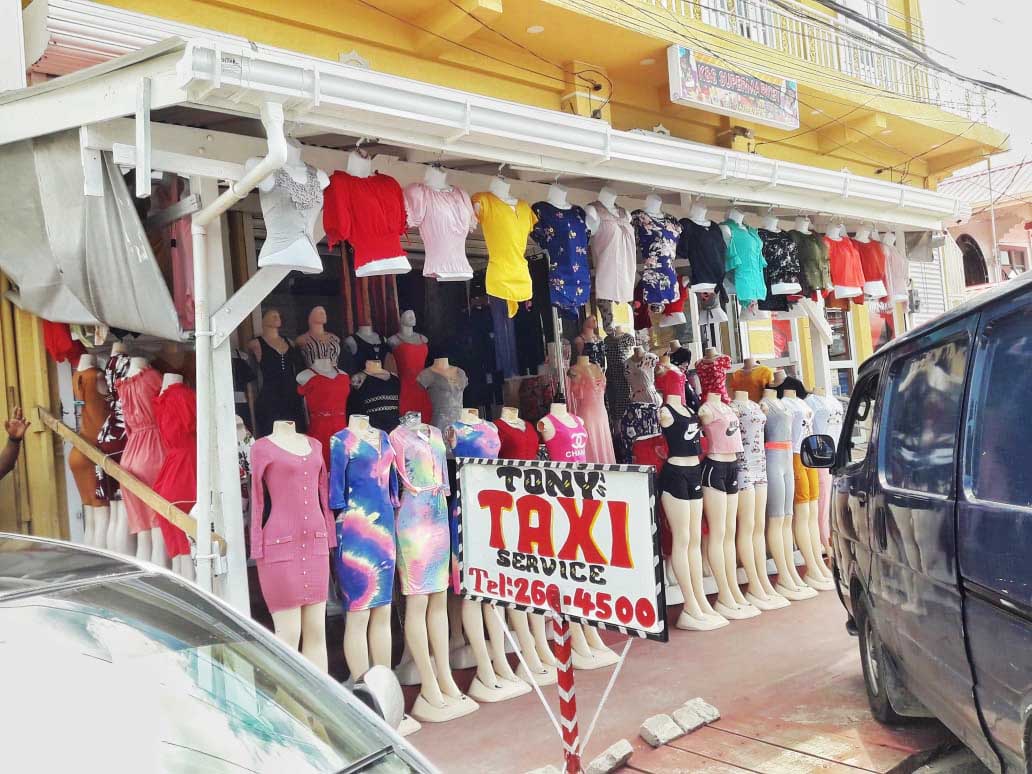Businesses in Parika are reeling from the impact of the COVID-19 pandemic having had to close for more than three months. Phase three of the six-phase reopening of Guyana which was implemented on July 17 allowed for a number of clothing businesses which were shuttered to reopen but the effects of the pandemic are such that they are far from returning to normal anytime soon.
The once bustling Parika is not as bright as before. Fruit and vegetable stalls, considered to be among the essential services, attract barely any customers let alone clothing stores and furniture stores. These stores have seen a significant drop in sales anywhere from fifty per cent to seventy five per cent. Some make less than a quarter of the sales they made prior to the pandemic. Many of these clothing stores rent spaces in commercial buildings and face considerable stress having to find the money for rent while having to provide for their livelihoods.
One of the commercial buildings that rents spaces to business proprietors is G&R Shopping Plaza, a popular mall along the Parika Public Road. According to the supervisor of one of these clothing boutiques, G. Young (only name provided), sales plummeted prior to the pandemic and her business was closed at the beginning of March for fear of rioting brought on by the general elections.
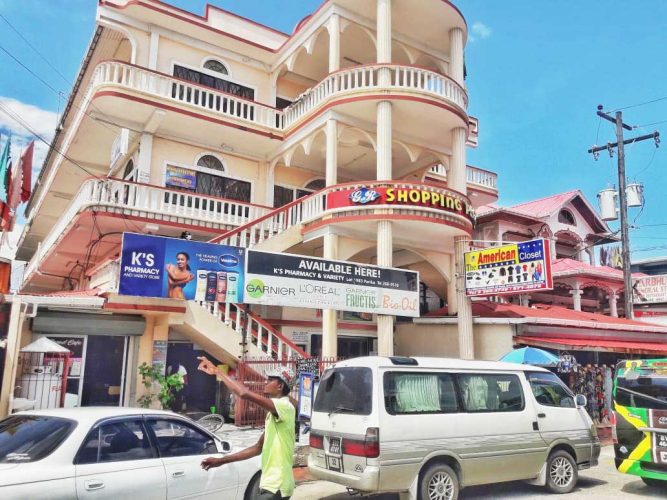
The business, she noted, has been open for more than four years now and in all the years, this is the worst sales have been.
Young recounted that during the time clothing stores were required to close their doors, the store she worked for tried to remain open but they found themselves in trouble with the law on several occasions resulting in them being fined $50,000 dollars. The owner was at another time detained at the Parika Police Station where he was kept for the day before he was released on $20,000 station bail.
The supervisor noted that she and two other employees were laid off during this period but were provided some assistance at the beginning of the three-month period. One of the employees who was renting an apartment at Parika was forced to return to her home in Goshen while the other sales representative has since resorted to making chips which she sells.
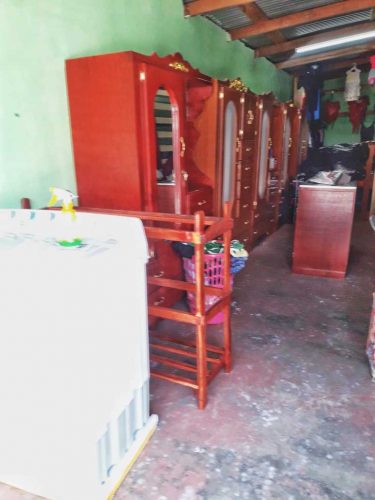
After being closed for several months, the store reopened some three Sundays ago. Young, along with a new employee, are working at the store. Since then, it has seen only one third or less of the profits it made before the pandemic. Pointing to an array of clothing, Young said that those pieces of clothing would normally have been sold during the course of the last several weeks but they are still there. The woman further shared that Thursdays and Sundays are the busiest days as people come to shop at the Parika/Hydronie Market, but busy as it seems, this does not provide more sales. She shared that often on these days a group of persons may enter the store but only one of these persons turns out to be a customer. In fact sometimes, the entire group may just be browsing as they would have come to shop at the market. Following their reopening, they began selling face masks as another avenue for income.
“Sales in Parika is very, very bad and it seems to me that it getting worse. The pandemic and the political instability cause it to be like this. We’re really suffering”, Nazlene Hussain, owner of Saudia’s Fashion said.
She and her husband hail from Hog Island in the Essequibo River where they farm ground provisions. They are currently residing at Leonora.

Chance
Hussain was not one of the business owners to find herself on the other side of the law. When they learnt that the National Emergency Measures and Curfew Order did not consider her business an essential service and therefore she was expected to close, she did not chance opening her store. During that time her three sales representatives were laid off. Hussain noted that one of the employees was her daughter-in-law while the other two were relatives whom she noted had some financial assistance from immediate relatives.
Along with her daughter-in-law, Hussain has kept one of her other two employees, adding that while it is difficult for her to pay staff, she knows that they need to earn an income. Saudia’s Fashion, she said, reopened their doors last week but being unable to pay both employees working at the same time, she rotates them, explaining that one works four days one week while the other does three days then they switch the number of days they work the next week.
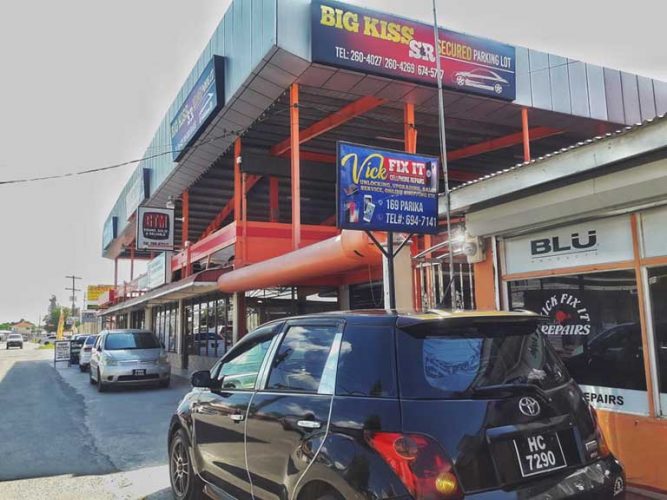
Asked whether they were required to pay any rent during the period she was closed, Hussain said that as a matter of fact, she did. She pays a monthly rent of $120,000 but for the three months she was closed, she was asked to pay $60,000 per month. Still paying half the rent during the time her business was shuttered was not easy and saw her delving into her savings to do so.
Hussain shared that her business saw a decrease of seventy-five per cent in sales and added that the drop in sales did not begin with the pandemic or elections but in fact started during the tenure of the APNU+AFC administration.
Meanwhile, Kavita Raghunandan, owner of K&N Furniture Store said having to close her business has drastically affected the lives of her employees and herself. Though the small space she rents houses furniture, several small appliances like pressing irons as well as kitchen sinks, over time she has resorted to selling clothing as a means of earning a quicker dollar.
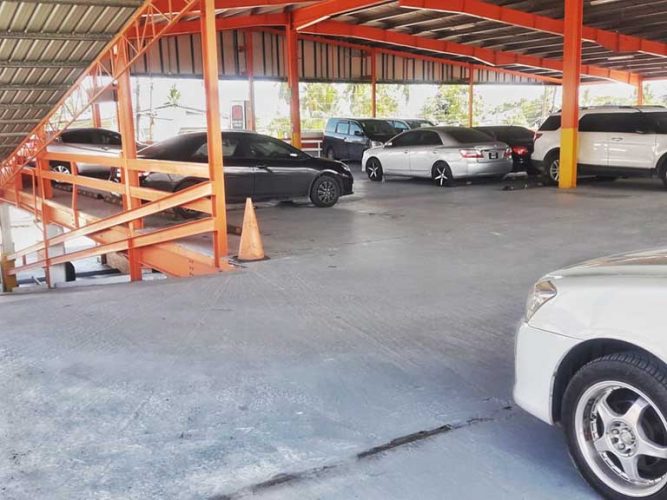
Her business was shuttered soon after the elections which she said was as a result of the owner of the building closing, which forced her and other business owners to close, then following the pandemic outbreak, they were required to close. Kavita told this newspaper that she pays $80,000 for her tiny space, adding that during the time the business was shuttered, she and other business owners were expected to pay their rent with no discounts.
The woman said that she tried talking with the owner of the building for her to be allowed to pay part of the rent since businesses were shuttered but the owner would not budge on the payment of rent. In addition, Kavita said she and her husband were also paying a mortgage on their home.
Kavita said while she could rotate her two employees, she decided against it. “They don’t have nothing to do. They are not getting jobs elsewhere so they have no means of income,” she explained. She is open Sundays to Fridays 8am to 5:30pm. The businesswoman disclosed also that due to the current situation, she cannot say how she intends to pay her staff, whether weekly, monthly or fortnightly adding that whenever business picks up a bit, they are paid – herself included. “Some days I make half my usual sales, some days is quarter the sales, some days, we don’t get any sale. It’s real bad, the situation,” lamented Kavita.
Blackboard
Over at Golden World Shopping Centre & Supermarket, a customer stood outside the entrance, having been told by the security guard that he could not enter since he wore no face mask. The guard pointed to a small blackboard which indicated that persons needed to be wearing face masks to enter. However, the customer did not have to wait long as one of the supermarket’s sales representatives arrived at the door with more than a dozen of the blue surgical masks. They were being sold at a $100 each. The customer quickly made his purchase and after his hands were sanitised by the same security guard, he was allowed in.
Manager of Golden World, Yulin Cho, explained that the supermarket also sold clothing. She noted that since they were considered an essential business, they remained open. Nonetheless, they have seen a decline in business as well.
Cho said that although they are seeing their regular customers, these individuals take extra care to buy only what they need. In regard to the clothing department, this section she said has not attracted much sales within the recent months.
For many of those persons who travel to the Essequibo Coast, Leguan, Wakenaam or Bartica and are driving their own vehicles but do not want to pay $1,920 for a parking space on one of the ferries, they would secure a spot at one of the two parking lots at Parika, and Big Kiss S&R Secured Parking Lot being the more popular of the two, often gets the customers. Customers pay a 12-hour parking fee of $800, $1,500 for 24 hours, $2,000 for two days, $3,000 for 3 days, and after four days, only $500 dollars is added to each extra day. They are open 24/7.
When Stabroek News visited, only one of the parking attendants was present at the time. Richard Bissoon was in the process of collecting the monies from drivers who had left their vehicles with them and he was returning their car keys. Big Kiss, he said, has been around for a number of years, though he couldn’t quite say how long exactly. The parking lot he showed has two levels for parking. Drivers can choose to park their vehicles on the lower level or take the ramp up to the top floor.
Big Kiss was never required to shutter its business but it has been affected by the pandemic. Bissoon said that prior to the pandemic, they kept some 100 vehicles on a daily basis but that number he said has literally been cut in half. He recalled that at one point he and the two other parking lot attendants were rotated. However, they have resumed working as per normal though the level of sales still remains at fifty per cent of normal sales.
Petitioned
Chairman of the Mora/Parika National Democratic Council (NDC), Jaideo Sookhoo when contacted by this newspaper said that the NDC had petitioned the Parika Police and other relevant authorities during the time non-essential businesses were required to be closed for businesses to be allowed to remain open. Sookhoo explained that it was unfair that some non-essential businesses were allowed to operate as per normal whereas other businesses were required to close their doors for selling the same items. At the time he noted, the police told him that individuals needed to observe the COVID-19 guidelines and that there was nothing they could do about it.
Sookhoo said that outside of the businesses suffering, the NDC also felt the impact of the pandemic. “We rely on the rates and taxes from these store owners. When we tell the police about some of the businesses still being opened while they close some, the police, they have different views on it. When some of these same clothing stores have to close, you find other clothes vendors vending outside of these stores, and nothing was being done about it”, the chairman complained.
Parika is known for being one of the hotspots for business in Guyana which is one of the reasons why there is talk of the community becoming a town. Speaking on this regard, Sookhoo said the last time he heard of plans on Parika becoming a town was sometime early last year when there was a meeting with the central government and Minister of Communities, Ronald Bulkan had spoken on this. “There were talks about Parika becoming a town, of the roads here being upgraded as well as the market centre in Parika. Minister Bulkan had also mentioned about the building of a new stelling,” recalled Sookhoo.
Then in March of this year there was a stakeholders’ meeting where the architectural work of the stelling was discussed but nothing he said was “put on paper.”
“The NDC has plans of its own that we are looking to put into action. We’ve already approach the regional administration, the Ministry of Public Health and other relevant authorities to make our health centre into a district hospital. We would like to see the empty marketing centre be made use of instead of the vendors vending at the roadside. The centre was built almost two years ago. We would also like to have designated car and bus parks. This was also raised at the meeting with the Ministry of Communities,” Sookhoo further said.
Such developments he posited, would positively impact the business community in Parika adding that the NDC is currently awaiting the new government to take office so that these plans can be implemented.
Though stores are just reopening, he shared that there are businesses that are still shuttered. “It’s not totally fixed”, the chairman cautioned, adding that even for these businesses that are still open, it is not likely that the economy will return to normalcy anytime soon.
